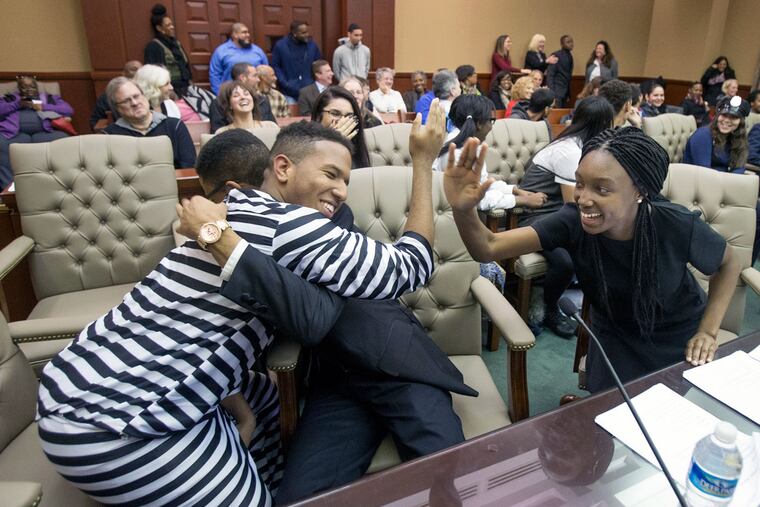Students do mock trial of Atticus Finch's case
The charges were serious: A brutal assault that left a young woman bruised and fighting for her life. Testimony on the witness stand was heated, emotional, and, at times, racially charged.

The charges were serious: A brutal assault that left a young woman bruised and fighting for her life. Testimony on the witness stand was heated, emotional, and, at times, racially charged.
But the onlookers who filled the federal courtroom in Camden on Tuesday night were all smiles. Even - especially - the judge presiding over the case.
Jamira Greene, a high school senior portraying defense attorney Atticus Finch in a mock trial rendering of the criminal case described in Harper Lee's novel To Kill a Mockingbird, urged the people sitting in the jury box to acquit. In impassioned closing remarks, she said the accused had been falsely targeted because he was black.
"In the name of God, do your duty," said Greene, a senior at Camden's LEAP Academy.
After the men and women playing the parts of jurors were ushered out to start deliberating, U.S. District Judge Joel Schneider looked at the 12 students assembled before his bench and said, "OK, you can exhale now."
There were giggles and sighs from the students, who had spent two months working on the performance as part of a program through the North Camden nonprofit Camden Adolescents Striving for Achievement. Some were dressed in jackets, ties, or skirts.
Myra Mercado, who portrayed a sheriff, donned a policeman's uniform and hat. Darwin Guzman, as the accused, Tom Robinson, wore a striped prison jumpsuit.
"Were you all nervous?" Schneider asked them. "It didn't show. You were terrific. . . . So much poise and maturity from teenagers so young."
The mock trial was spearheaded by Angel Osorio, a lecturer at Rutgers-Camden who formerly worked as the community-justice officer for the Camden County Prosecutor's Office. Before losing her job as part of 2011 budget cuts, she ran a criminal-justice internship for teens that included mock trials, a junior police academy, and more.
"Working on something like this really has the potential to draw them to different careers in law enforcement and criminal justice," she said. "They get a true feel for what that means. And it's a resumé-builder."
Osorio used her contacts to get seasoned law enforcement professionals on board. In addition to working with CASA's Tim Gallagher and Lourdes Gonzalez, the students practiced with Mary Alison Albright, former chief prosecutor of the homicide unit for the Prosecutor's Office, and Marty Devlin, one of the office's retired homicide investigators.
The students read the novel, watched the 1962 film based on it, and discussed the case. They studied dialogue and added text when needed to enhance testimony.
"Any of the questions that are off script, they generated themselves," Albright said.
Osorio also brought in Schneider, who oversees mock trial competitions and who arranged for the courthouse to be kept open two hours later than normal so the performance could be held in a courtroom.
Students threw themselves into the roles. Zorielie Borges, who portrayed the alleged victim, choked up during her testimony, pointed a finger angrily at the accused, then turned on the jurors, calling them cowards if they did not convict. As the students waited for a verdict, some remained in character, with the two teams still arguing the facts of the case. Others clasped hands as they waited in anticipation.
After some time, jurors returned their verdict: Not guilty. The accused erupted in cheers and high-fived his defense team. One of the prosecutors, enraged, swept his files from his desk and stormed out.
Schneider said he hoped to see some of them in his courtroom again - but as attorneys, he noted, not defendants.
"You all have bright futures," he said. "It would be an honor to see some of you here someday."
856-779-3876 @AESteele